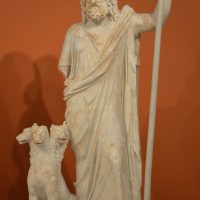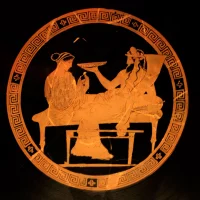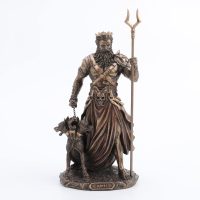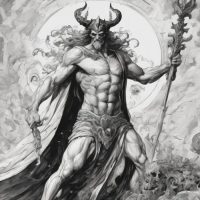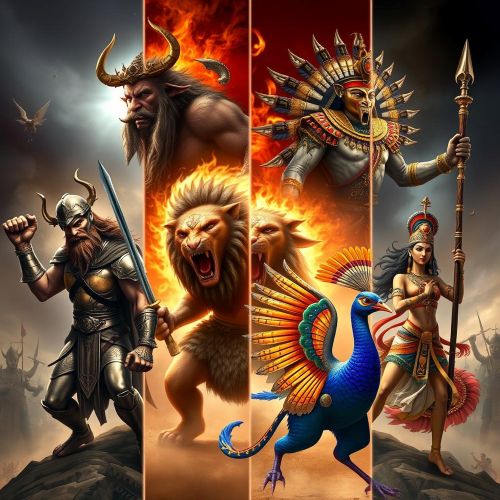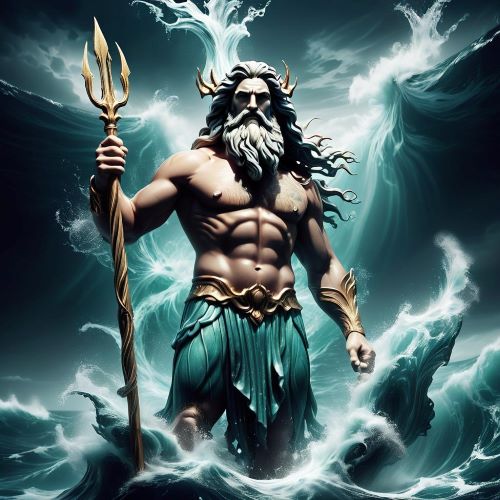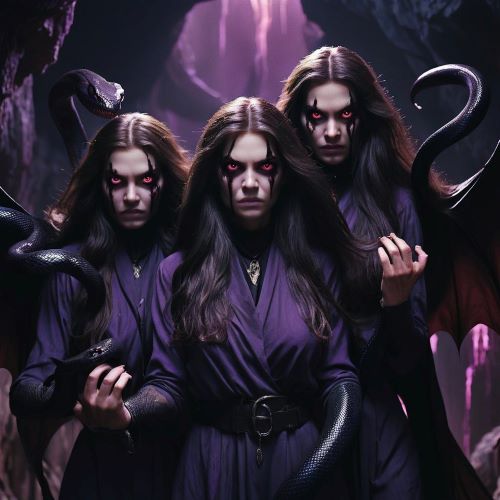Hades : God of the Underworld
Listen
At a glance
| Description | |
|---|---|
| Origin | Greek Mythology |
| Classification | Gods |
| Family Members | Cronus (Father), Rhea (Mother), Hestia, Demeter and Hera (Sisters), Zeus and Posiedon (Brothers), Persephone (Wife) |
| Region | Greece |
| Associated With | Death, Underworld |
Hades
Introduction
Hades, the enigmatic ruler of the underworld, often finds himself shrouded in shadows, both literally and figuratively. Unlike his flamboyant siblings, Zeus and Poseidon, Hades holds a domain far removed from the glittering heights of Mount Olympus and the vast expanse of the seas. Yet, his role as the keeper of the dead and the unseen realms makes him a crucial figure in Greek mythology. His name, which has become synonymous with his realm, is often seen as meaning “the unseen one” since antiquity. Despite his grim role, Hades is a complex and nuanced figure in Greek mythology.
Physical Traits
Depictions of Hades in ancient Greek art and literature often underscore his somber and imposing presence. Adorned in regal attire, he is commonly portrayed as a figure draped in darkness, contrasting sharply with the radiant visages of his siblings, Zeus and Poseidon. Rather than basking in the glory of Mount Olympus or the vastness of the seas, Hades reigns over the underworld, a realm cloaked in shadows and inhabited by the departed souls. This association with death and the afterlife lends an ominous aura to his character.
Typically depicted as a robust, bearded figure, Hades often wears a solemn expression, his countenance reflecting the weight of his responsibilities. His iconic helmet, known as the Helm of Darkness or the Cap of Invisibility, further emphasizes his enigmatic nature. By his side stands Cerberus, the fearsome three-headed dog guarding the gates of the underworld, a symbol of Hades’ dominion over the realm of the dead. In some portrayals, he is depicted wielding a scepter or holding the key to his kingdom, symbols of his authority and power.
Mounted on a chariot drawn by ebony horses, Hades cuts a striking figure as he traverses the depths of the underworld. Despite his imposing demeanor, artistic interpretations of Hades often reveal layers of complexity, with hints of melancholy or wisdom lurking behind his stern facade. Unlike the youthful beauty of his Olympian counterparts, Hades possesses a mature and dignified presence, exuding an aura of authority befitting his role as king of the underworld. Whether seated upon his throne or surveying his domain, Hades commands respect and reverence as a formidable deity of ancient Greek mythology.
Family
Hades, eldest son of the Titans Cronus and Rhea, emerged as one of the pivotal figures in Greek mythology alongside his brothers Zeus and Poseidon. Their ascent to power followed the tumultuous Titanomachy, a war against their forebears that culminated in victory for the younger gods. As the spoils of war were divided, Zeus claimed the heavens, Poseidon the seas, and Hades, through a fateful draw, inherited dominion over the underworld.
In the intricate tapestry of Greek mythology, Hades’ realm extended beyond mere governance; it became intertwined with his association with Persephone, daughter of Demeter, goddess of agriculture. Mythology weaves a tale of abduction, as Hades swept Persephone into the depths of the underworld to become his queen. Yet, this mythic narrative transcends mere abduction; it symbolizes the cyclical rhythms of nature, as Persephone’s sojourn in the underworld coincides with winter’s barren embrace, while her return heralds the rebirth of spring. Thus, Hades and Persephone’s union embodies the eternal dance between life and death, growth and decay, echoing throughout the natural world.
Other names
Hades, the enigmatic ruler of the underworld, bears a plethora of epithets that illuminate the diverse facets of his realm and character. Among these titles is “Aides,” denoting the unseen, a fitting designation for the deity presiding over the hidden depths beneath the earth’s surface. “Pluton,” stemming from the Greek word for wealth, acknowledges the abundant riches concealed within the earth, ranging from precious metals to valuable minerals. Additionally, “Kthonios” signifies his close affinity with the chthonic deities, the powerful gods associated with the underworld and the earth’s subterranean forces.
Throughout Greek mythology, Hades assumes various names and epithets, each offering unique insights into his domain and persona. Homer refers to him as “The Infernal Zeus,” highlighting his formidable presence and authority. Similarly, he is known as “the host of many” or “the Attractor of Man,” reflecting his role as the ultimate destination for all mortals. The epithet “Pluto” or “Pluton” carries connotations of wealth and abundance, hinting at Hades’ role as the guardian of the earth’s treasures and the amassed riches of the deceased.
In addition to “Pluto,” Hades is also addressed as “Aidoneus,” derived from the Greek word for “unseen” or “invisible,” underscoring his elusive nature as the ruler of the underworld. Another epithet, “Haides,” originates from the Greek word “aides,” meaning “the unseen” or “the invisible,” further emphasizing Hades’ enigmatic presence and dominion over the hidden realms beyond mortal perception. Collectively, these epithets weave a rich tapestry of symbolism and meaning, illuminating the complexities of Hades’ domain and his enduring significance within Greek mythology.
Powers and Abilities
Hades, as the ruler of the underworld, wielded unparalleled power and authority over its denizens and inhabitants. With final judgment resting in his hands, he possessed the ability to mete out divine punishment or bestow blessings upon souls dwelling within his domain. His dominion extended beyond mere governance, encompassing control over the very fabric of existence.
Among his myriad abilities, Hades held sway over the fate of departed souls, guiding them to their rightful destinations in the afterlife. Whether consigning them to the blissful realms of Elysium or condemning them to the depths of Tartarus, his word was absolute. Cerberus, the formidable three-headed guardian of the underworld’s gates, stood as a testament to Hades’ authority, ensuring the integrity of his realm and preventing unauthorized entry.
In addition to his mastery over the dead, Hades possessed the power to manipulate the material world, bestowing wealth and fertility upon the earth’s surface. The treasures of the underworld, including precious metals and minerals, flowed under his control, influencing the cycle of life and sustaining the vitality of the living world. Furthermore, his union with Persephone, the goddess of spring, symbolized the symbiotic relationship between the underworld and the realm of agriculture, reinforcing his role as a deity intricately intertwined with the natural order.
Armed with a scepter symbolizing his sovereignty and wearing the Helm of Invisibility to move unseen amongst mortals, Hades embodied the essence of authority and mystery. His presence loomed large in the pantheon of Greek gods, commanding reverence and fear alike, as the enigmatic ruler of the unseen realms.
Modern Day Influence
Hades, despite his ancient origins, maintains a significant presence in contemporary culture, particularly within the realm of video games. Supergiant Games’ “Hades” marks a departure from the studio’s previous works, introducing players to a roguelike dungeon crawler set in the depths of the underworld. It represents the studio’s first foray into early access gaming, offering players a fresh perspective on Greek mythology.
In this game, players assume the role of Zagreus, a mysterious figure from the Greek pantheon whose identity is shrouded in enigma. Through fragmentary texts, Zagreus is revealed to be the son of Hades, adding layers of intrigue to his character and deepening players’ immersion in the mythological narrative.
Beyond the realm of gaming, Hades’ influence permeates various forms of media, including literature, film, and television. In Rick Riordan’s acclaimed “Percy Jackson” series, Hades assumes a prominent role as the father of protagonist Nico di Angelo, offering a nuanced portrayal of the deity beyond his traditional depiction as a menacing figure.
Similarly, in popular video games such as “God of War” and the eponymous “Hades,” players encounter the character of Hades in dynamic and immersive ways, further cementing his status as a timeless icon of myth and legend. Whether portrayed as a fearsome villain or a complex ruler grappling with his fate, Hades continues to captivate audiences with his enduring presence and enigmatic persona.
Related Images
Frequently Asked Questions
What is lorem Ipsum?
I am text block. Click edit button to change this text. Lorem ipsum dolor sit amet, consectetur adipiscing elit. Ut elit tellus, luctus nec ullamcorper mattis, pulvinar dapibus leo.
What is lorem Ipsum?
I am text block. Click edit button to change this text. Lorem ipsum dolor sit amet, consectetur adipiscing elit. Ut elit tellus, luctus nec ullamcorper mattis, pulvinar dapibus leo.
What is lorem Ipsum?
I am text block. Click edit button to change this text. Lorem ipsum dolor sit amet, consectetur adipiscing elit. Ut elit tellus, luctus nec ullamcorper mattis, pulvinar dapibus leo.
What is lorem Ipsum?
I am text block. Click edit button to change this text. Lorem ipsum dolor sit amet, consectetur adipiscing elit. Ut elit tellus, luctus nec ullamcorper mattis, pulvinar dapibus leo.
What is lorem Ipsum?
I am text block. Click edit button to change this text. Lorem ipsum dolor sit amet, consectetur adipiscing elit. Ut elit tellus, luctus nec ullamcorper mattis, pulvinar dapibus leo.


